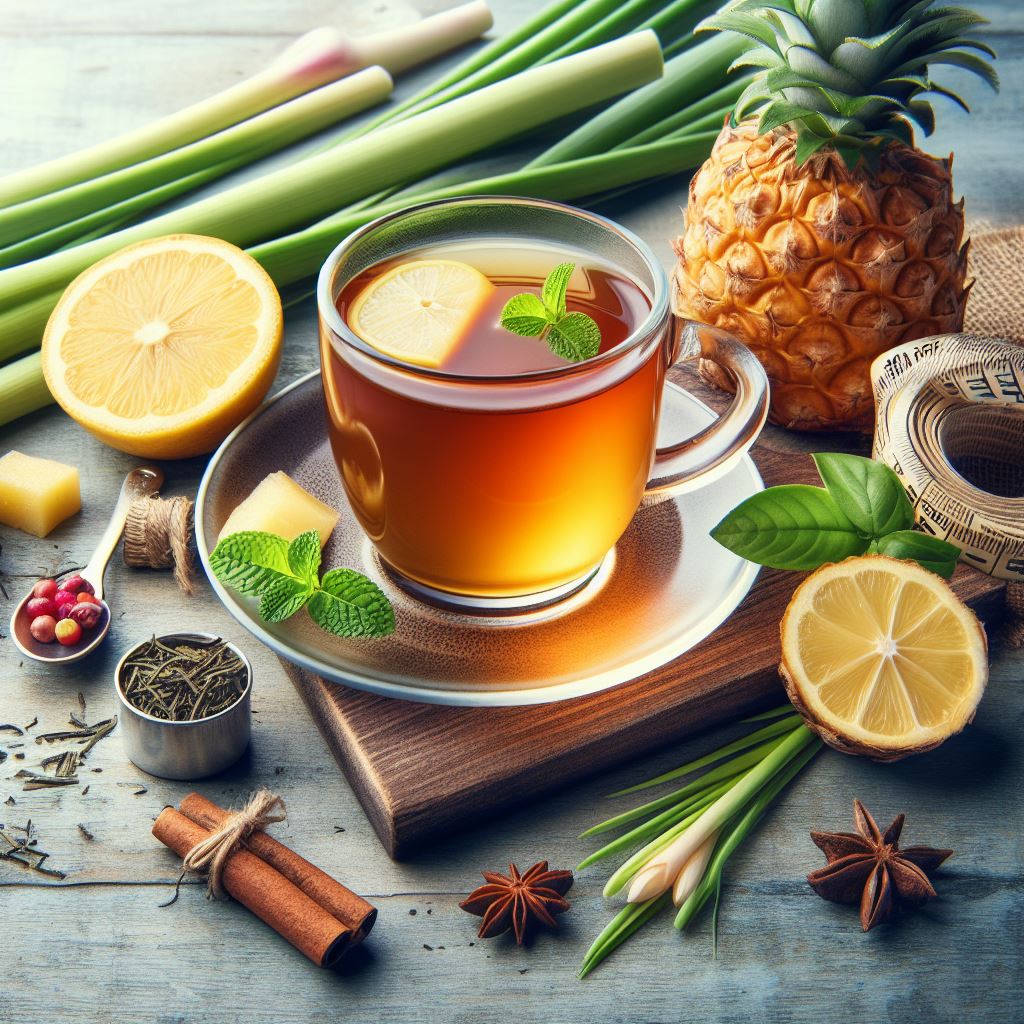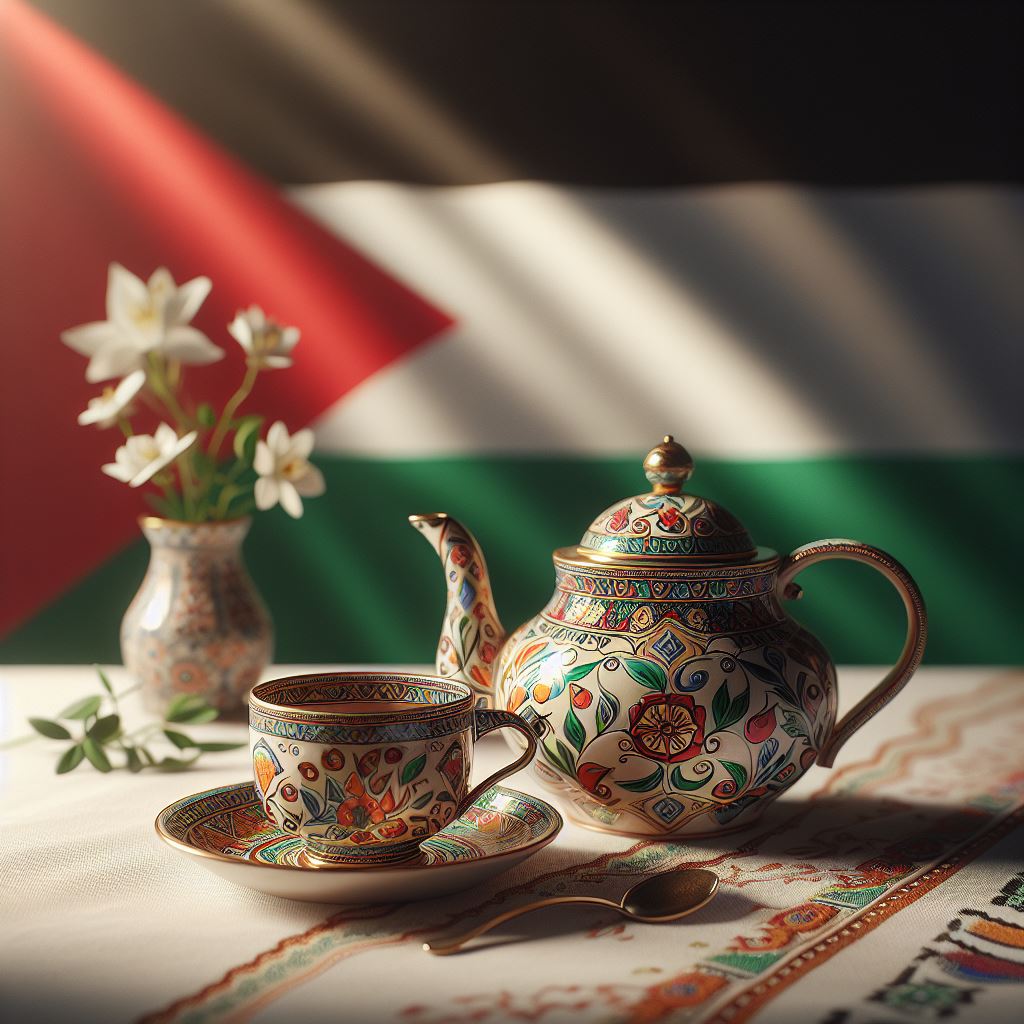Ramadan is a time of spiritual reflection and heightened devotion in Islam where fasting from dawn until sunset is observed. It not only embodies physical restraint but also serves as a period for spiritual growth and increased charitable behavior. In this serene time, the incorporation of tea into Suhoor (dawn meal) and Iftar (fast-breaking evening meal) can be both beneficial and delightful during Ramadan!
Tea, with its vast array of types and flavors, offers benefits that can support the body and mind during fasting and provide a moment of tranquil reflection. So let’s delve into how “ramadan tea” can become a staple in your daily routine during this holy month!

Why Drink Tea for Suhoor During Ramadan?
During Suhoor (the meal consumed before the break of dawn), it’s essential to choose nourishing foods and drinks that provide lasting energy throughout the day. It’s a time to hydrate and prepare the body for the hours of fasting ahead. So adding tea to your morning ritual is a great option!
Choosing the right tea for Suhoor can aid in hydration, digestion, and provide a sustained release of energy. It’s a gentle way to wake up the body and mind and prepare for the day’s fast. Likewise, if you’re someone who likes to go straight back to sleep after Fajr (morning prayer), you may want to try a calming tea instead.

Tea Selection for Suhoor (with the intention of staying awake)
If you’re the type of person who likes to stay up after praying and seize the day, you may want to try a tea with a gentle boost. Starting the morning with a strong tea such as black tea may lead to a crash, leaving you tired throughout the day. So for a refreshing start to the day, I would recommend something light, such as:
- Green tea: Known for its light taste and antioxidant properties. This tea can help fight inflammation whilst providing a gentle caffeine boost to slowly wake you up.
- White tea: The least processed tea, offering a delicate flavor. This tea also has a modest amount of caffeine to awaken the senses without overstimulation.

The Benefits of Green Tea and White Tea for Suhoor:
There are many reasons to drink tea during Suhoor, and for different reasons. However, for someone wanting to stay awake and start the day, both green tea and white tea are ideal candidates. Here’s why:
- Hydration: They are both hydrating, which is crucial during Suhoor to prepare for a day of fasting. This helps maintain the body’s fluid balance without causing excessive fluid loss, making the fast more manageable. These teas are also rich in catechins, which have diuretic properties, promoting hydration further.
- Gentle and Sustained Caffeine: Both teas contain lower amounts of caffeine compared to a black tea. This can help provide a gentle energy boost without the jitters, helping you stay alert if you plan to stay awake after Suhoor.
- Depending on your caffeine preference you can choose one of the two. For the most gentle experience, white tea contains a lower amount of caffeine compared to green tea. Whereas, green tea has a moderate amount of caffeine, to give you that extra kick, without being too overpowering.
- Antioxidant Properties: White tea is rich in antioxidants, which protect the body against oxidative stress and inflammation. These antioxidants can support oral hygiene, a healthy digestive tract, and maintain a healthy metabolic rate during fasting hours.
Why not try Green Tea with Mint for a sustained energy boost with the added benefits for digestive health from the refreshing mint!
Tea Selection for Suhoor (with the intention of going back to sleep after prayer)
As for some people, they prefer to return to sleep after praying Fajr. In this case, a tea that promotes relaxation and aids digestion is more ideal. Herbal teas, in particular, are more suitable for this situation as they are caffeine-free. For a calming return to sleep I would suggest:

• Mint Tea
Mint is not only refreshing but also aids in digestion and can soothe stomach discomfort. Here are some benefits of drinking mint tea for Suhoor:
- Digestive Aid: Mint tea is known for its ability to soothe the stomach and aid in digestion. It can help relieve symptoms like bloating, indigestion, and even irritable bowel syndrome (IBS). This makes it easier to rest comfortably after eating.
- Relaxing Effects: The natural compounds in mint have a relaxing effect on the body and mind. Drinking mint tea can help reduce stress and promote a sense of calm. Perfect for falling back asleep after Suhoor and Fajr prayers.
- Freshness and Hydration: Mint tea provides a refreshing taste and helps maintain hydration. This is essential during the fasting hours of Ramadan. Plus, it’s a caffeine-free option that won’t disrupt your sleep cycle.
• Chamomile Tea
Famous for its relaxing properties, chamomile can help ease back into sleep while providing anti-inflammatory benefits. Here are some benefits of drinking chamomile tea for Suhoor:
- Sleep Inducer: Chamomile contains apigenin, an antioxidant that binds to certain receptors in the brain that may promote sleepiness and reduce insomnia. It’s well-known for its ability to improve sleep quality.
- Anti-Anxiety: Chamomile has natural sedative effects that can help alleviate anxiety and provide a sense of tranquility. This makes it easier to relax and fall asleep after early morning prayers.
- Muscle Relaxation: The antispasmodic properties of chamomile can help relax muscles and reduce physical tension. This may be beneficial for some people after performing the Fajr prayer.
- Digestive Comfort: Chamomile tea can soothe the digestive tract, reducing the likelihood of discomfort that might otherwise disturb your sleep after Suhoor.
Why not try a Ginger Lemon Tea to gain immune support from the ginger, detoxifying lemon, and blood sugar control. Ideal for preventing spikes and crashes leading to cravings.
Why Drink Tea for Iftar During Ramadan?
Iftar is the meal that breaks the fast at sunset, a time of joy and communal sharing. It’s an opportunity to replenish energy levels from the day of fasting and enjoy the company of loved ones.
I find that a good strong tea is a great addition to your Iftar meal as it can re-energise you along with the food. The caffeine boost can prepare you for the final prayer of the evening (Isha), and the Taraweeh prayer. Especially If you’re someone who stays all the way until the end of Taraweeh, you may need something to perk you up!
Likewise, the tea after Iftar can also help rehydrate the body, aid in digestion, and provide a comforting ritual to end the day. The warmth of the tea can also be soothing and help prepare the body for rest.

Tea Selection for Iftar
By this time of the day, I’m usually drained of energy and in need of a boost. I find it important to uplift the spirit after a day of fasting and prepare for the long night of prayers. Here are some suggestions for strong teas to re-energise you:
- Assam tea: A robust black tea that can invigorate the senses and provide a hearty flavor to complement Iftar meals. The stronger caffeine content will also perk you up and give you the motivation to stay until the end of Taraweeh!
- Earl Grey: as a black tea Infused with bergamot oil, it offers a citrusy twist to the traditional black tea, perfect for a refreshing start to the evening. The citrus scent of bergamot in Earl Grey tea is also known to have a calming effect and can uplift the mood after a day of fasting.
- Chai: A blend of black tea and spices like cardamom, cinnamon, and ginger, chai can stimulate digestion and warm the body. Chai is particularly good for its immune boosting properties due to the combination of spices. These can help boost the immune system and reduce inflammation, which is beneficial during the fasting. Additionally, it is the ideal drink for Muslims in cold regions for warming you up in the evening!
Why not try ‘Adeni Chai’, The Traditional Yemeni Tea?

The Benefits for Iftar
Asides from the reasons already mentioned, there are many other reasons why you should drink these teas during Iftar. Here are a few more reasons why:
- Energizing: After a day of fasting, the caffeine in these black teas can provide a much-needed energy boost.
- Rich Flavors: the full-bodied flavors are satisfying and can be a comforting beverage to enjoy after a long day of fasting.
- Digestive Aid: The tannins in black tea can aid digestion, which is beneficial after Iftar when the digestive system starts working again after a period of rest.
- Hydration: Like other teas, these teas are hydrating, helping to replenish fluids after a day without water.
For those looking for a caffeine-free alternative, why not try a Hibiscus and Rosehip Tea! The hibiscus is a natural thirst quencher for rehydration, along with the nutrient-rich reship to replenish the body’s needs after a day of fasting!
Cultural Significance of Tea During Ramadan
In many cultures observing Ramadan, tea is more than just a beverage—it’s a symbol of hospitality and a centerpiece for social gatherings. From the Moroccan mint tea ceremonies to the spiced chai of South Asia, tea rituals during Ramadan foster a sense of community and shared experience. Here’s a few common tea traditions that are sometimes incorporated into Ramadan meals:

- Arabic Tradition: In many Arab countries, tea is a staple at Iftar. Often served with mint and dates, it’s a traditional combination that helps with digestion and provides a refreshing end to the fast.
- Middle East: Across the Middle East, drinks like Jallab, made from dates, grape molasses, and rose water, are popular. These beverages are not only hydrating but also rich in calories, which is essential after a day of fasting.
- Morocco: Moroccan tea is especially popular during Ramadan. It is common to have several cups of tea after Iftar, enjoyed throughout the evening with Arabic sweets and social activities like card games.
- General Islamic Culture: Sharing tea during Ramadan fosters a sense of togetherness and strengthens community bonds, as people come together to mark significant moments in their lives with a shared cup of tea.
Conclusion
As you can see, tea is a versatile and beneficial addition to both Suhoor and Iftar during Ramadan. It’s not just about hydration and nourishment; it’s also about the moments of calmness and community it brings.
I hope this article has helped and given you some inspiration for your morning and evening rituals. This Ramadan, try take the time to explore different “ramadan tea” varieties and find the flavors that resonate with you. Share your experiences and traditions with us, and let’s celebrate the joy of tea together!





Leave a Comment